 Petzlover
Petzlover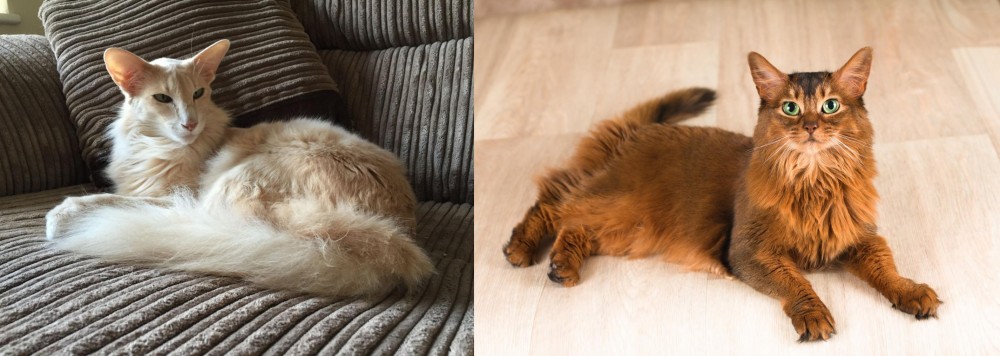 Oriental Longhair is originated from United Kingdom but Somali is originated from United States. Both Oriental Longhair and Somali are of same weight. Both Oriental Longhair and Somali has same life span. Both Oriental Longhair and Somali has same litter size. Both Oriental Longhair and Somali requires Moderate Maintenance.
Oriental Longhair is originated from United Kingdom but Somali is originated from United States. Both Oriental Longhair and Somali are of same weight. Both Oriental Longhair and Somali has same life span. Both Oriental Longhair and Somali has same litter size. Both Oriental Longhair and Somali requires Moderate Maintenance.
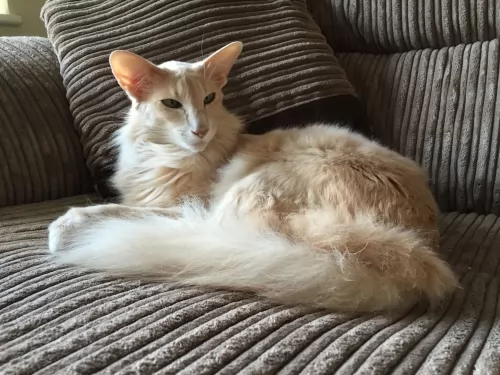 Your Oriental Longhair cat has his foundations in the Siamese breed. The Siamese came from Thailand to the UK in the 1800s.
Your Oriental Longhair cat has his foundations in the Siamese breed. The Siamese came from Thailand to the UK in the 1800s.
Sometimes a litter of Siamese kittens produced a long-haired variety but in the 1950s breeders started honing in on these longer haired Siamese cats.
Various crossings took place and Oriental Shorthairs came about. By breeding these Shorthairs with Balinese cats, the Oriental Longhair came about in the 1970s.
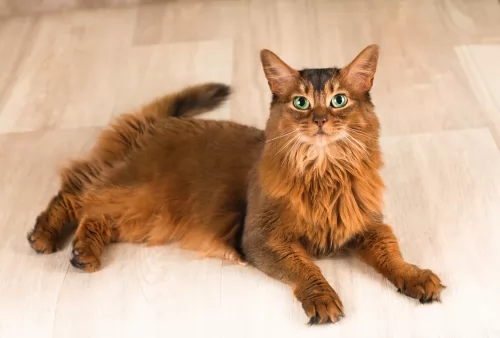 The Somali is a medium- to longhaired Abyssinian. It was in Britain that the original introduction of the longhaired gene took place.
The Somali is a medium- to longhaired Abyssinian. It was in Britain that the original introduction of the longhaired gene took place.
The first Somali cats came about in 1940 and it was British breeder Janet Robertson who exported some of her Abyssinian kittens to New Zealand, Australia and North America, Australia. Most of the kittens had long hair and breeders started showing an interest.
An American Abyssinian breeder Evelyn Mague decided to call her cats Somalis and the breed was recognized internationally by 1991.
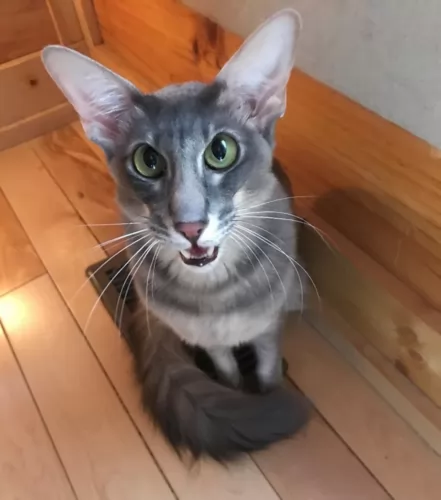 The Oriental Longhair is a medium-sized cat with a fairly long, muscular, lean body. The Oriental Longhair actually resembles the Siamese cat.
The Oriental Longhair is a medium-sized cat with a fairly long, muscular, lean body. The Oriental Longhair actually resembles the Siamese cat.
They also come in an outstanding array of colors and patterns with the coat being long and silky. The coat can be a solid color but you can also find tabby-type coats as well as tipped coats. The cat doesn’t have an undercoat and coat lies fairly flat against the body. You will also hear it being referred to as a semi-longhair.
The tail is attractive and forms quite a bushy plume.
The Oriental Longhair cat has almond-shaped green eyes. If you see the white Orientals, they can have green or blue eyes. They can also be odd-eyed.
These cats are intelligent, curious, and good-natured and they love to talk. Therefore it is important that such a cat breed have a home where there is plenty of company.
They’re active cats too, loving to play and bound and leap. He'll want to willingly join in with some of your games. The cat will certainly need some exciting toys to keep him occupied.
They are loyal cats and become loving and devoted to their human family, getting on well with children in the home as well as other pets.
They don’t like being left alone at all and will prefer to have company, even if it is from another pet.
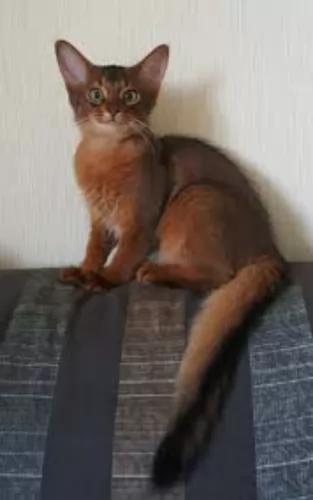 The beautiful Somali is a medium-sized cat which means he weighs in the region of 3 to 6kg. He is muscular and lean with the ears being set wide apart.
The beautiful Somali is a medium-sized cat which means he weighs in the region of 3 to 6kg. He is muscular and lean with the ears being set wide apart.
The ears are also tufted. The eyes of the Somali are almond-shaped and are usually a brown shade or green in color. The legs are long and the paws are also somewhat tufted. The tail is well plumed.
The Somali's coat is lovely and soft, while being thick and lustrous. The adult cats have a ruff. The Somali's coat comes in a range of colors but the most regular color is a beautiful brownish color with black ticking.
The Somali is an intelligent cat that relies heavily on its human owners for company as well as love and care.
They’re fun-loving cats that get on well with children in the home and from other pets. They are active cats and will need exercise. They should have some high perches and cat trees available so they can jump and climb.
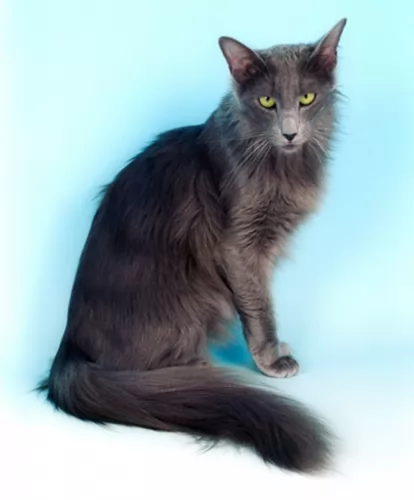 Your Oriental Longhair is such a friendly, lively cat and he makes a splendid companion. It is an inquisitive cat and likes to be part of the activity in the household.
Your Oriental Longhair is such a friendly, lively cat and he makes a splendid companion. It is an inquisitive cat and likes to be part of the activity in the household.
He is a social, talkative cat and has always got a lot to say/ They love the attention of their human family and don’t like being separated too long from them.
When you get one of these cats, you get both an entertainer and a friend.
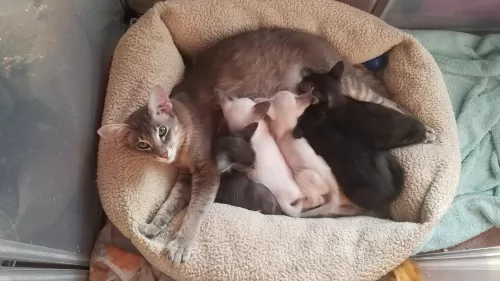 The Oriental Longhair is generally considered a healthy breed. Because the cat can be prone to some inherited conditions, it is always a wise move to buy a kitten from a reputable breeder.
The Oriental Longhair is generally considered a healthy breed. Because the cat can be prone to some inherited conditions, it is always a wise move to buy a kitten from a reputable breeder.
A couple of these diseases to look out for include Progressive Retinol Atrophy which is a degenerative condition that can lead to blindness.
Also, look out for periodontal disease which is common in many cat breeds.
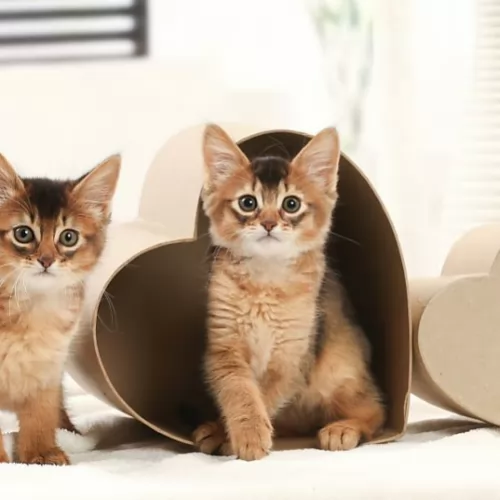 Although the Somali cat breed is healthy, as with many other cat breeds, there are a few hereditary diseases found in the Abyssinian that may be linked to this breed too. Look out for eye problems with the cat as well as anaemia.
Although the Somali cat breed is healthy, as with many other cat breeds, there are a few hereditary diseases found in the Abyssinian that may be linked to this breed too. Look out for eye problems with the cat as well as anaemia.
Progressive retinal atrophy (PRA) is a degenerative disorder of the retina. This eye disease can either be inherited or acquired.
When a cat gets sick there are some antibiotics that have been associated with progressive retinal atrophy in cats. Cats can also develop vision loss if their diet is deficient.
You have to be very aware of your cat’s diet and ensure that he is getting all the right ingredients, one of which is amino acid taurine. If you can see that your cat is battling to see, you should get him immediately to the vet.even though there is no treatment for PRA. . The vet will explain to you how to make life more comfortable for your pet.
Anemia isn’t a specific disease with your cat but rather the result of some other disease or condition. The most common sign that your cat has anemia is that you won’t find that normal pink color of the gums. Your cat will be listless and there may also be signs of blood loss such as blood in the feces or urine. Your vet will do several tests to diagnose the anemia.
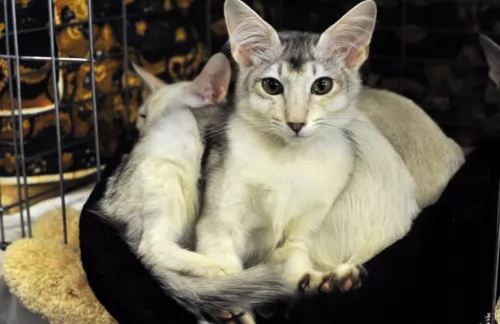 This is a slim cat and you can easily tell when he has put on weight. Be very careful with how much you feed your cat and what you feed him.
This is a slim cat and you can easily tell when he has put on weight. Be very careful with how much you feed your cat and what you feed him.
Cats are carnivores and you need to ensure that his diet is rich in meaty ingredients. These cats have long slim legs and extra weight can put pressure on the cat’s joints. Keep your cat lean and healthy. If in any doubt about diet for your cat, speak to your vet, Always ensure a bowl of fresh, cool water.
Prepare to have a cat included in your family. Invest in food and water bowls, a cat bed, grooming brushes, toys, climbing tree, scratching post and litter box. A cat box for transporting your pet to the vet is also a good idea.
The Oriental Longhair loves to leap up into high areas so he will need a climbing tree. Try to get your cat out into the sunshine where possible and allow him to climb into a tree.
The cat’s medium- to long hair will require brushing once or twice a week. When you brush your pet gently but purposefully, he loves it and it becomes a bonding session.
Provide your cat with a litterbox and make sure to clean out the box every day. You can do that by buying a small plastic rake at the pet shop and it keeps the litter nice and even for your pet.
Have your cat neutered or spayed to prevent unwanted kittens.
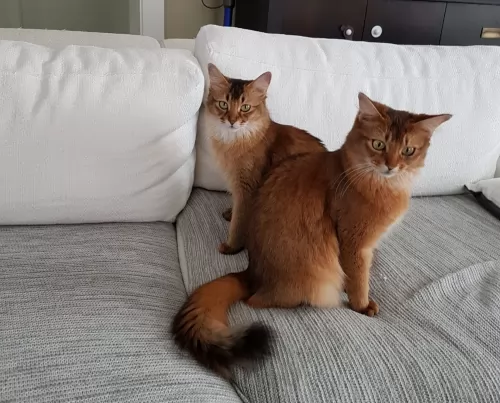 Cats can sometimes be finicky eaters and even the most delectable morsels might be ignored.
Cats can sometimes be finicky eaters and even the most delectable morsels might be ignored.
Every cat is unique but every cat is a carnivore – a meat eater – and requires a host of nutrients in their food to be healthy. Commercial cat foods aren’t all one and the same. You get different food for kittens, different foods for young adults, for pregnant cats, for energetic cats, and so on.
There is cat food for every season of a cat’s life. Other important considerations are feeding the right quantity of food to your cat.